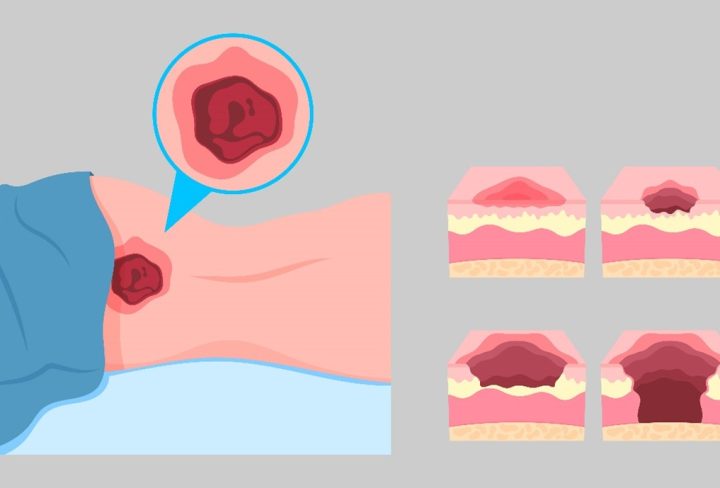Bed sores develop when prolonged pressure on the skin reduces blood flow to specific areas, leading to tissue damage and breakdown.
Risk Factors: Immobility, frailty, advanced age, poor nutrition, moisture (from sweat or incontinence), and medical conditions affecting circulation increase susceptibility.
Stages: Classified into stages I to IV based on severity, ranging from persistent redness (stage I) to extensive tissue damage involving muscles and bones (stage IV).
Prevention Strategies
- Regular Repositioning: Encouraging changes in body position every 2 hours minimizes pressure on vulnerable areas.
- Support Surfaces: Using specialized mattresses, cushions, or pads to distribute pressure and reduce the risk of skin breakdown.
- Skin Care: Keeping skin clean and dry, applying moisturizers to prevent dryness or breakdown, and avoiding harsh soaps and excessive heat or cold.
- Nutrition: Providing a balanced diet (particularly vitamin C and zinc), and fluids to promote skin health and tissue repair.
- Monitoring: Regularly inspecting skin for signs of redness, warmth, or changes in texture, especially over bony areas like heels, hips, and elbows.
Treatment Options
- Wound Care: Cleaning wounds with saline solution, applying appropriate dressings (e.g., hydrocolloids, foams) to promote healing, and managing infection with antibiotics if necessary.
- Offloading: Relieving pressure on affected areas through padding, positioning, and mobility aids to facilitate healing.
- Advanced Therapies: Utilizing techniques such as negative pressure wound therapy (NPWT) to enhance healing by applying controlled suction to the wound area.
Psychological and Social Impact
Bed sores not only cause physical discomfort but also have significant psychological and social impacts. Emotional support addresses the distress caused by pain and lifestyle changes. Social support includes assistance with daily tasks and mobility aids to maintain mental well-being and social connections. Multidisciplinary care involving various healthcare professionals ensures comprehensive treatment plans tailored to individual needs, enhancing overall management and recovery from bed sores.
Bed sores are preventable with proactive measures focusing on pressure relief, skin care, nutrition, and early detection. Effective management involves a multidisciplinary approach tailored to individual needs, emphasizing holistic care and patient education. By implementing these strategies, healthcare providers can significantly improve outcomes and enhance the quality of life for individuals at risk of or affected by bed sores.


